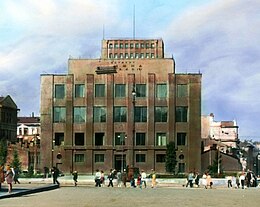Marx-Engels-Lenin Institute
From Wikipedia, the free encyclopedia
The Lenin Institute building in Moscow as it appeared in 1931.
The Marx-Engels Institute gathered unpublished manuscripts by Karl Marx, Frederick Engels, V.I. Lenin, and other leading Marxist theoreticians as well as collecting books, pamphlets, and periodicals related to the socialist and organized labor movements. By 1930 the facility's holdings included more than 400,000 books and journals and more than 55,000 original and photocopy documents by Marx and Engels alone, making it one of the largest and richest holdings of socialist-related material in the world.
In February 1931 director of the Marx-Engels Institute David Riazanov and others on the staff were purged for ideological reasons. In November of that same year the Marx-Engels Institute was merged with the larger and less scholarly Lenin Institute (established in 1923) to form the Marx-Engels-Lenin Institute.
The institute was the coordinating authority for the systematic organization of documents released in the multi-volume works Marx-Engels-Gesamtausgabe (Marx-Engels Collected Works), the Lenin Polnoe sobranie sochineniia (Complete Collected Works), I.V. Stalin Sochineniia (Works), and numerous other official publications. The institute was officially terminated in November 1991, with the bulk of its archival holdings now residing with a successor organization, the Russian State Archive of Socio-Political History (RGASPI).
Contents
History
Establishment
David Riazanov (1870-1938), head of the Marx-Engels Institute from its formation in 1919 until his arrest in February 1931.
The institute assembled and maintained a research library devoted to socialist-related theme, amassing in a little over 10 years a collection of some 400,000 books, pamphlets, and journals, 15,000 manuscripts, and 175,000 photocopies of original documents held elsewhere.[1] Among these were 55,000 manuscripts by Karl Marx and Frederick Engels alone — far and away the single most important accumulation of such material.[1]

